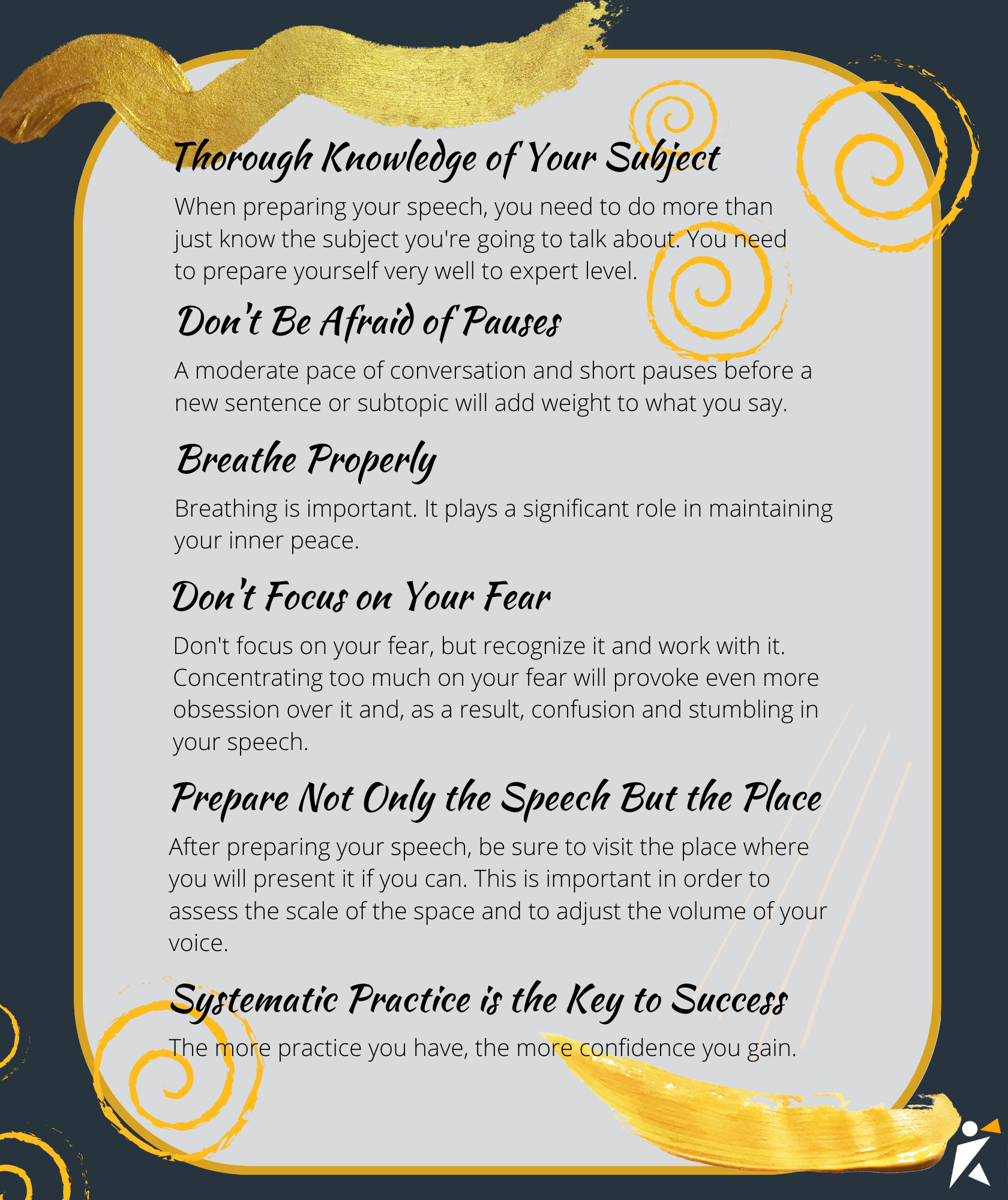Your First Public Speech: Learn Not to Be Afraid

For many students, the first time they speak in front of an audience is daunting. This feeling arises from the fear of failing and being ridiculed. Various images of unpleasant situations can emerge in the imagination, and there is only one ending in those images: inevitable failure. I don’t insist that public speaking is so easy you have nothing to worry about. Regardless of how many people are listening to you, it is a serious event and you should be prepared for it. But what you should know for sure is that you will succeed if you are sufficiently prepared and use the following tips.

Thorough Knowledge of Your Subject
When preparing your speech, you need to do more than just know the subject you're going to talk about. You need to prepare yourself very well to the expert level. This way, you will be interesting to your audience and will be able to capture and hold their attention throughout your speech. Such proper preparation takes time. If you are a student, you will have a lot of assignments. Among them is essay writing. You can pay someone to write essayand free up more time for thorough preparation for public speaking. In this way, top writers can quickly provide online help and your essay will be excellent. Meanwhile, you will be preparing for your speech. The truth is that fear recedes when you are confident. You will be confident when you feel you understand everything about the subject of your speech.
Don't Be Afraid of Pauses
Often, nervousness during a speech will result in a speaker trying to get it over with and hurrying their words. Such a reaction will not indicate your excellent knowledge of the topic but will show your anxiousness. Therefore, tune in to moderation. Take your time. This does not mean that you should stretch out the words of your speech with the speed of a sloth. But a moderate pace of conversation and short pauses before a new sentence or subtopic will add weight to what you say. Moreover, deep breathing during these short pauses will also help you calm down.
Breathe Properly
As mentioned, breathing is important. It plays a significant role in maintaining your inner peace. This applies not only to public speaking but also to any important situations that we systematically deal with throughout our lives. Regardless of the complexity of the moment, the first thing we need to do is not rush into the whirlpool of solving it, even though this is the first thing we want to do. Stop. Stop sharply. And I'm not talking about physical motion here. Stop the maelstrom of negative thoughts. Stop the stack of ugly images of tragedy that our vivid imagination immediately draws. Then take a deep breath and hold it, and do this exercise several times. After that, you will feel relieved and have more clarity in your thoughts. This means you will be able to continue your activities more calmly.
Don't Focus on Your Fear
Fear is a normal thing for every living being. It was fear, not fearlessness, that allowed our distant ancestors to survive, because fear gave rise to caution and prudence in their actions. So don't focus on your fear, but recognize it and work with it. Concentrating too much on your fear will provoke even more obsession over it and, as a result, confusion and stumbling in your speech.
Prepare Not Only the Speech But the Place
After preparing your speech, be sure to visit the place where you will present it if you can. This is important in order to assess the scale of the space and to adjust the volume of your voice. Ask a friend to stand at the back of the auditorium and listen to you speaking. This will help you understand how to set up the audio. At the same time, you'll check that it works properly. Be sure you can be heard in the back rows and it will give you confidence and peace of mind. Check the serviceability of other technical equipment if your speech will be accompanied by a visual presentation. All these are technical issues that need to be sorted in advance. Doing so will give you peace of mind on the day of your speech.
Systematic Practice is the Key to Success
It is rare that something we do for the first time is immediately correct and one hundred percent good. This is the same with public speaking. The more practice you have, the more confidence you gain. And each of your performances will be one step better than the previous one.
Public speaking is all about your interaction with the audience, be it small or large, of a specific professional nature, or a variety of types. Set aside enough time and prepare well. Research your topic thoroughly and be prepared for questions. Familiarize yourself with the venue and check the technical equipment. Practice your intonation and breathing. Remember to take regular short pauses, emphasizing the beginning of a new thought. Accept your fear, don't be afraid of it, and do it.
About the author:
Robert Griffith - Content writer on educational and student topics. Blogger of columns on creating professional presentations and speeches based on them. Researcher of behavioral strategies





